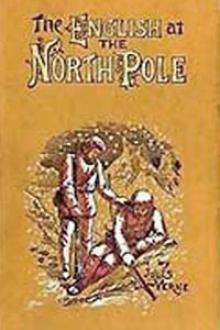The World of Ice - Robert Michael Ballantyne (best selling autobiographies TXT) 📗

- Author: Robert Michael Ballantyne
Book online «The World of Ice - Robert Michael Ballantyne (best selling autobiographies TXT) 📗». Author Robert Michael Ballantyne
The stores, in order to relieve the strain on the ship, were removed to Store Island, and snugly housed under the tent erected there, and then a thick bank of snow was heaped up round it. After this was accomplished, all the boats were hauled up beside the tent, and covered with snow, except the two quarter-boats, which were left hanging at the davits all winter. When the thermometer fell below zero, it was found that the vapours below, and the breath of the men, condensed on the beams of the lower deck and in the cabin near the hatchway. It was therefore resolved to convert some sheet-iron, which they fortunately possessed, into pipes, which, being conducted from the cooking-stove through the length of the ship, served in some degree to raise the temperature and ventilate the cabins. A regular daily allowance of coal was served out, and four steady men appointed to attend to the fire in regular watches, for the double purpose of seeing that none of the fuel should be wasted and of guarding against fire. They had likewise charge of the fire-pumps and buckets, and two tanks of water, all of which were kept in the hatchway in constant readiness in case of accidents. In addition to this, a fire-brigade was formed, with Joseph West, a steady, quiet, active young seaman, as its captain, and their stations in the event of fire were fixed beforehand; also, a hole was kept constantly open in the ice alongside to insure at all times a sufficient supply of water.
Strict regulations as to cleanliness and the daily airing of the hammocks were laid down, and adhered to throughout the winter. A regular allowance of provisions was appointed to each man, so that they should not run the risk of starving before the return of the wild-fowl in spring. But those provisions were all salt, and the captain trusted much to their hunting-expeditions for a supply of fresh food, without which there would be little hope of their continuing in a condition of good health. Coffee was served out at breakfast and cocoa at supper, besides being occasionally supplied at other times to men who had been engaged in exhausting work in extremely cold weather. Afterwards, when the dark season set in, and the crew were confined by the intense cold more than formerly within the ship, various schemes were set afoot for passing the time profitably and agreeably. Among others, a school was started by the captain for instructing such of the crew as chose to attend in reading, writing, and arithmetic, and in this hyperborean academy Fred Ellice acted as the writing master, and Tom Singleton as the accountant. The men were much amused at first at the idea of "goin' to school," and some of them looked rather shy at it; but O'Riley, after some consideration, came boldly forward and said, "Well, boys, bad luck to me if I don't think I'll be a scholard afther all. My old gran'mother used to tell me, whin I refused to go to the school that was kip be an owld man as tuck his fees out in murphies and potheen,--says she, 'Ah! ye spalpeen, ye'll niver be cliverer nor the pig, ye won't.' 'Ah, then, I hope not,' says I, 'for sure she's far the cliverest in the house, an' ye wouldn't have me to be cliverer than me own gran'mother, would ye?' says I. So I niver wint to school, and more be token, I can't sign me name, and if it was only to larn how to do that, I'll go and jine; indeed I will." So O'Riley joined, and before long every man in the ship was glad to join, in order to have something to do.
The doctor also, twice a-week, gave readings from Shakespeare, a copy of which he had fortunately brought with him. He also read extracts from the few other books they happened to have on board; and after a time, finding unexpectedly that he had a talent that way, he began to draw upon his memory and his imagination, and told long stories (which were facetiously called _lectures_) to the men, who listened to them with great delight. Then Fred started an illustrated newspaper once a-week, which was named the _Arctic Sun_, and which was in great favour during the whole course of its brief existence. It is true, only one copy was issued each morning of publication, because, besides supplying the greater proportion of the material himself, and executing the illustrations in a style that would have made Mr. Leech of the present day envious, he had to transcribe the various contributions he received from the men and others in a neat, legible hand. But this _one_ copy was perused and re-perused, as no single copy of any paper extant--not excepting _The Times_ or _Punch_--has ever yet been perused; and when it was returned to the editor, to be carefully placed in the archives of the _Dolphin_, it was emphatically the worse for wear. Besides all this, a theatre was set agoing, of which we shall have more to say hereafter.
In thus minutely recounting the various expedients which these banished men fell upon to pass the long dark hours of an Arctic winter, we may, perhaps, give the reader the impression that a great deal of thought and time were bestowed upon _amusement_, as if that were the chief end and object of their life in those regions. But we must remind him that though many more pages might be filled in recounting all the particulars, but a small portion of their time was, after all, taken up in this way; and it would have been well for them had they been able to find more to amuse them than they did, for the depressing influence of the long-continued darkness, and the want of a sufficiency of regular employment for so many months added to the rigorous nature of the climate in which they dwelt, well-nigh broke their spirits at last.
In order to secure warmth during winter, the deck of the ship was padded with moss about a foot deep, and down below the walls were lined with the same material. The floors were carefully plastered with common paste and covered with oakum a couple of inches deep, over which a carpet of canvas was spread. Every opening in the deck was fastened down and covered deeply over with moss, with the exception of one hatch, which was their only entrance, and this was kept constantly closed except when it was desirable to ventilate. Curtains were hung up in front of it to prevent draughts. A canvas awning was also spread over the deck from stem to stern, so that it was confidently hoped the _Dolphin_ would prove a snug tenement even in the severest cold.
As has been said before, the snow-drift almost buried the hull of the ship, and as snow is a good _non-conductor_ of heat, this further helped to keep up the temperature within. A staircase of snow was built up to the bulwarks on the larboard quarter, and on the starboard side an inclined plane of snow was sloped down to the ice to facilitate the launching of the sledges when they had to be pulled on deck.
Such were the chief arrangements and preparations that were made by our adventurers for spending the winter; but although we have described them at this point in our story, many of them were not completed until a much later period.
CHAPTER XI.
A hunting-expedition, in the course of which the hunters meet with many interesting, dangerous, peculiar, and remarkable experiences, and make acquaintance with seals, walruses, deer, and rabbits.
We must now return to Fred Ellice and his companions, Meetuck the Esquimau, O'Riley, and Joseph West, whom we left while they were on the point of starting on a hunting-expedition.
They took the direction of the ice-hummocks out to sea, and, seated comfortably on a large sledge, were dragged by the team of dogs over the ice at the rate of ten miles an hour.
"Well! did I iver expect to ride a carriage and six?" exclaimed O'Riley in a state of great glee as the dogs dashed forward at full speed, while Meetuck nourished his awful whip, making it crack like a pistol-shot ever and anon.
The sledge on which they travelled was of the very curious and simple construction peculiar to the Esquimaux, and was built by Peter Grim under the direction of Meetuck. It consisted of two runners of about ten feet in length, six inches high, two inches broad, and three feet apart. They were made of tough hickory, slightly curved in front, and were attached to each other by cross-bars. At the stern of the vehicle there was a low back composed of two uprights and a single bar across. The whole machine was fastened together by means of tough lashings of raw seal-hide, so that, to all appearance, it was a rickety affair, ready to fall to pieces. In reality, however, it was very strong. No metal nails of any kind could have held in the keen frost--they would have snapped like glass at the first jolt--but the sealskin fastenings yielded to the rude shocks and twistings to which the sledge was subjected, and seldom gave way, or if they did, were easily and speedily renewed without the aid of any other implement than a knife.
But the whip was the most remarkable part of the equipage. The handle was only sixteen inches in length, but the lash was twenty _feet_ long, made of the toughest seal-skin, and as thick as a man's wrist near the handle, whence it tapered off to a fine point. The labour of using such a formidable weapon is so great that Esquimaux usually, when practicable, travel in couples, one sledge behind the other. The dogs of the last sledge follow mechanically and require no whip, and the riders change about so as to relieve each other. When travelling, the whip trails behind, and can be brought with a tremendous crack that makes the hair fly from the wretch that is struck; and Esquimaux are splendid _shots_, so to speak. They can hit any part of a dog with certainty, but usually rest satisfied with simply cracking the whip--a sound that produces an answering yell of terror, whether the lash takes effect or not.
Our hunters were clothed in their Esquimau garments, and cut the oddest imaginable figures. They had a soft, rotund, cuddled-up appearance, that was powerfully suggestive of comfort. The sledge carried one day's provisions, a couple of walrus harpoons with a sufficient quantity of rope, four muskets with the requisite ammunition, an Esquimau cooking-lamp, two stout spears, two tarpaulins to spread on the snow, and four blanket sleeping-bags. These last were six feet long, and just wide enough for a man to crawl into at night, feet first.
"What a jolly style of travelling, isn't it?" cried Fred, as the dogs sprang wildly forward, tearing the sledge behind them, Dumps and Poker leading and looking as lively as crickets.
"Well now, isn't it true that wits jump?--that's jist what I was sayin' to meself," remarked O'Riley, grinning from ear to ear as he pulled the fur-hood farther over his head, crossed his arms more firmly on his breast, and tried to double himself up as he sat there like an overgrown rat. "I wouldn't exchange it





Comments (0)